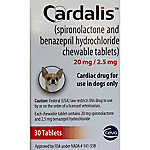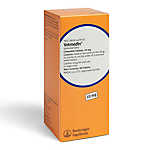Hover over image to zoom inClick image to open expanded view
$71.99
$112.19
Fulfilled by
About this item
Description: Cardalis® Chewable Tablets are used for the adjunctive management of clinical signs of mild, moderate, or severe congestive heart failure in dogs.Combination of an Angiotensin Converting Enzyme inhibitor (ACEI) with an Aldosterone receptor blocker has been proven to be better than an ACEI alone to counteract the effects of degenerative heart conditions Convenient once a day dosing for improved compliance Highly palatable non–allergenic beef flavored chew
Product: Cardalis® Chewable Tablets
For: Dogs
Generic Name: Spironolactone, Benazepril
Brand Names: Cardalis®
Drug Class: Aldosterone Antagonist, Angiotensin–Converting Enzyme (ACE) Inhibitor
Manufacturer: Ceva
Product Description & Form: Cardalis® 20 mg⁄2.5 mg Chewable Tablets 30 ct: 10 mm, brown, oblong tablet, scored in half, no imprint. (NDC 13744–0805–30) Cardalis® 20 mg⁄2.5 mg Chewable Tablets 30 ct Cardalis® 40 mg⁄5 mg Chewable Tablets 30 ct: 13 mm, brown, oblong tablet, scored in half, no imprint. (NDC 13744–0807–30) Cardalis® 80 mg⁄10 mg Chewable Tablets 30 ct: 17 mm, brown, oblong tablet, scored in half, no imprint. (NDC 13744–0809–30)Cardalis® 40 mg⁄5 mg Chewable Tablets 30 ctCardalis® 80 mg⁄10 mg Chewable Tablets 30 ct
Benefits:











